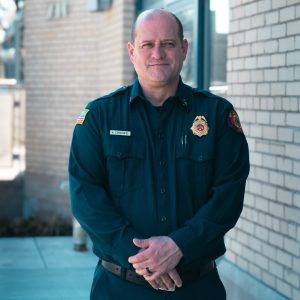Social services coordinator to join MLPD

n September, a trained social services expert will join Mt. Lebanon to connect residents in need with mental health resources. Police Chief Jason Haberman initially proposed creating the new position to the Mt. Lebanon Commission in March.
More than 30 candidates applied for the social services care coordinator position by the July 5 deadline. The municipality conducted a two-step interview process in August with “high-level, high-quality candidates,” many of whom possessed master’s degrees in social work, said Haberman. At the time of publication, the new hire is expected to start in mid-September and will be based in the public safety building.
Haberman said the coordinator will help in a variety of situations, from children in need of mental health services, to older adults with limited care capacities, to people suffering from hoarding disorders. By delivering resources directly to residents, the coordinator will alleviate the workload of police officers, who aren’t equipped to provide extensive mental health resources and support.
“We get a lot of (mental health-related) information here at the police department,” said Haberman. “A lot of people want to call us to relay it, and now we have a resource to outlet that information to.”
Employing social workers within police departments is a rather new strategy to handle behavioral and mental health crises. Nearby communities, including Baldwin Borough, Ross, Hampton, Wilkinsburg, Millvale and Sharpsburg, have social workers or interns in their police departments. Their social workers may accompany officers on calls and during active emergencies. Mt. Lebanon’s program will run differently.
“The difference with our model and others is this is not a traditional co-responder model. What we are is a resource delivery model,” said Haberman. There is “a lot more front-end work and care coordination. And so, from a scene safety standpoint, it wouldn’t be any different than animal control or any other resource that we have that delivers services outside of law enforcement.”
Ideally, the coordinator will identify individuals in need of assistance, provide resources to them and prevent a crisis from developing in the first place, said Haberman. The coordinator may also train officers and municipal staff on mental health conditions, mental health first aid, suicide prevention and self-care initiatives, with the intent of delivering these services to residents.
In addition to helping residents, the social services care coordinator will be available to officers and other municipal employees. Haberman said the coordinator will have the pulse of many departments—police, fire or other municipal entities—that may need assistance. “We’re going to have an expert in-house to recognize [issues],” he said.
The police department’s attitude and approach toward the mental health of employees has evolved in recent years, said Haberman. “We recognize it’s OK to not be OK, [but] that’s not something that we always recognized.”
“Keep an eye on each other; keep an eye on yourselves … If you need people to talk to, we can help provide those individuals to you.” – Jason Haberman, Mt. Lebanon Police Chief
Whether officers are dealing with a traumatic work-related incident or a personal situation, Haberman said he and the deputy chiefs tell officers: “Keep an eye on each other; keep an eye on yourselves … If you need people to talk to, we can help provide those individuals to you.”
Haberman said when officers suffer in silence, it can lead to ineffective policing. When officers’ unaddressed mental health issues build, “ultimately, they’re not delivering services to our community in appropriate ways, whether it’s misdirected aggression or whether it’s just frustration. And however it comes out, what we don’t want is for those things to occur,” said Haberman.
“I really want to help lower the temperature in the room, in a figurative and literal sense, to help our officers navigate life and deal with the problem appropriately.”
As of July 31, the Mt. Lebanon Police Department handled 243 calls related to behavioral and mental health in 2024. The department began tracking these calls in 2022—and it isn’t a simple task.
When someone makes a call to 911, there is no “mental/behavioral health” box for the dispatcher to check. The records department manually reviews call logs and transcripts, narratives of the police reports, police time spent on the service call and history of visits to the residence.
What may have been recorded as a “neighbor dispute” from the dispatcher may actually be a mental health issue. Once the recordkeeper reviews the entire chain of events, they can categorize cases and pass them on to the social services care coordinator.
The records process highlighted and quantified the mental health needs of the community, according to Haberman. It helped the department “recognize that there is a need to change our service delivery.” Internally, Haberman noted a “high degree of confidence the program will work. It’s been met with a lot of enthusiasm.”





